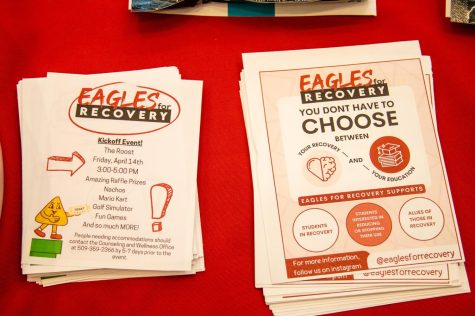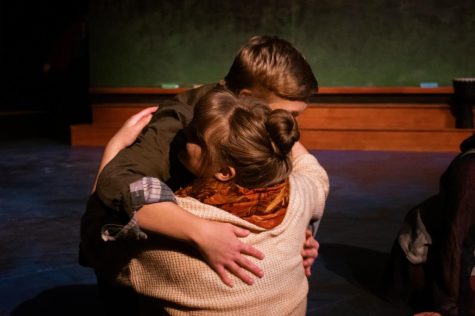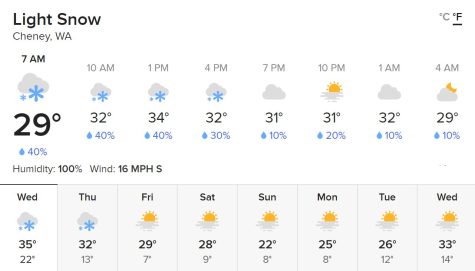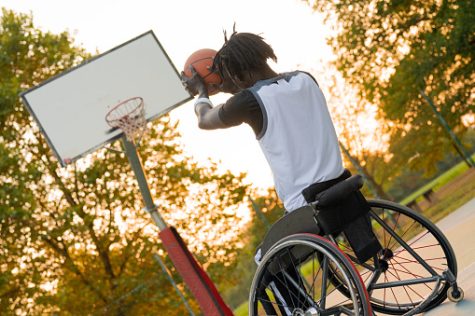Guide to encountering different opinions on campus
November 8, 2021
On October 3rd and October 13th, there were two separate instances of a man preaching to students about religion in the mall right outside the PUB.
Encountering a “street preacher” on the Mall outside Eastern’s PUB may not have been what some students expected coming back to campus this fall, but that’s what they have been exposed to the past couple of weeks.
EWU Police Officer Nick Bickley said it’s not uncommon.
Easterner: Are the protests a common thing?
Bickley: We do typically have at least a couple of incidents of people either preaching or protesting on campus every year
Easterner: Do the protesters ever become violent?
Bickley: No
Easterner: What kind of protocol do you have for protestors?
Bickley: We have trained with the Spokane Police Department on riot control. We trained with our department and in-service on what to do with those types of situations. The main focus is keeping the peace, so we intervene and protect all parties involved if people get violent. The end goal is that the protest can end with no enforcement needed. So we try to intervene before something like an assault takes place. We also try to educate people on what’s appropriate and what is not appropriate behavior. So they can avoid committing assault and harassment. Now and then, that does happen, and so if enforcement action is needed. Often, what we do is show up and try to be a visual deterrent to keep the peace, and if required, we will make a protection line where we can separate the parties involved and provide some level of protection for all sides.
Easterner: Has COVID created any complications regarding public speaking?
Bickley: Not to my knowledge. They are still allowed to come on campus since it is an open campus. An open campus is probably the main reason somebody comes up to Eastern to either voice their opinion, protest against something or preach. Regarding COVID restrictions, as long as they do not violate Eastern policy, they are allowed to participate in that freedom of speed/freedom of protest if they are in a building.
Easterner: Are visitors required to wear a mask on campus or show proof of vaccination?
Bickley: The EWU police department does not personally enforce masks or vaccination. Eastern has its policy regarding masks, whether indoors or an outdoor gathering of 500 people or more. The university has a policy regarding vaccination in place and has departments and personnel in charge of monitoring vaccination status.
Easterner: Do you guys handle all protests the same regardless of topic?
Bickley: Yes. As long as they are within their constitutional right and are not stepping outside of that and engaging in something criminal, we are a neutral third party regardless of the topic. I encourage everybody to know their constitutional rights and to exercise their constitutional rights. And it’s my job to make sure people stay safe, whether it’s something I agree with or not. I don’t get an opinion when I’m on duty, and I’m just a neutral third party that’s there to help protect people.
Easterner: If a protestor directly targets a student, what can they do?
Bickley: It would depend on what is being said. There’s always instances every time that we have somebody preach. We always have people who disagree with the message. Regardless of the topic, because someone disagrees with the statement and feels unsafe doesn’t mean that a crime has been committed. If somebody threatens somebody, then we’ll address it. But if somebody doesn’t think that what is deemed ‘politically correct or ‘respectful,’ they might not like it or agree with it, that’s still a freedom of speech. We will work with that student/faculty/ staff member or any citizen in general on things they can do to remove themselves from that situation and feel safer. But there’s not always a time we can take enforcement action against the fact that they said something that somebody doesn’t agree with.
Easterner: What is an example of what would cross the line?
Bickley: A person cannot threaten harm against a person or property. That would be a crime which is a form of harassment. So, for example, if somebody was to come out here and say, “I don’t like males” or “I don’t like females, so I’m going to beat that person up,” that’s a form of harassment. Now there are also things like threatening to light a building on fire crossing a line. We’ve had instances where we’ve had to take enforcement action against somebody who threatens to injury somebody or their property, so that’s the line that would be crossed. A popular topic that people preach about is homosexuality; if someone were to preach against homosexuality, that would offend many people. But we don’t necessarily take enforcement action on that because it’s not a threat against harm. So there has to be some type of element of a crime for us to take enforcement action. And as long as their not overstepping that line, they are in their constitutional right to preach, protest, or assemble.
Easterner: What are the students’ rights if they feel like they’re in danger?
Bickley: That’s always a situation that we take very seriously. Our main priority is everybody’s safety, and that includes our students. If a student is ever in a position, whether a protest or just a disagreement with a person in a classroom setting or outside a classroom and they feel unsafe, we always encourage them to contact us. Whether through our emergency line or 911, we can get in touch with that person, work through the issue, and help them feel safe. Just because a crime isn’t being committed does not mean they can’t reach out to us. We wear a lot of different hats, and sometimes it’s not necessarily a law enforcement role that we’re playing. But more of a part of “what are some ways we can keep me safe” or “what can I do to avoid these types of situations” There are many different ways we can work with problems and help them feel better.
Easterner: What are some of the resources a student can go to?
Bickley: Well, I guess it depends on the situation that they’re in. There’s always the head of departments if you’re a student in a higher education department or secondary teaching department, the science department. You can go to specific departments; you can talk about it with one of your professors. The Counseling and Psychological Services or CAPS (located in Martin Hall on the second floor to the left) campus. Let’s say you’re living on campus; you can reach out to your CAs, or RLC; they’re an excellent resource to have, you can always reach out to the police department. We have many officers with many different skills and resources to offer, and sometimes it’s just able to talk to somebody. We’re on 24 hours a day. Sometimes we get a call a two o’clock in the morning, and occasionally, it can contact a little bit lonely, so we have absolutely no issues with someone calling us at any time of day saying, “I need to talk to somebody,” so we’re a resource. We also recommend that you reach out to a friend or a family member. There are many places that a student can go to find help that suits their needs. There’s a lot of different campus programs, clubs, and activities that offer a lot of excellent resources. For example, the Pride Center is a fantastic resource for many students dealing with specific issues and want to reach out to somebody. There’s Chicano, Chicana Studies, Africana Studies, the American Indian Education Center. There are all sorts of places on campus. We’re a very diverse campus, which is fantastic. We have a lot of different areas that can help people.
Easterner: What is your advice if a student encounters someone preaching something they don’t necessarily agree with?
Bickley: The first thing that I would say is when somebody is either protesting or preaching or just disagreeing with you, they only have the power that you give them. If somebody is preaching in, let’s say, the mall right outside of the pub, if there’s nobody there to listen to them, you can’t get offended, you can’t get feelings hurt, you can’t be afraid of something that might happen. These people preach to crowds and protest to groups, and they try to get a response. And if you give them a response, then you give them exactly what they’re looking for. So my main advice is if it’s something that you don’t support, find something more productive to invest your energy in. We can’t control other people; we can only control ourselves and our actions and behaviors. So, while I can’t control the situation of who might be protesting, I can control whether or not I stay and listen to it. To remove yourself from the situation, and then if you want to reach out to a resource, do that.

















